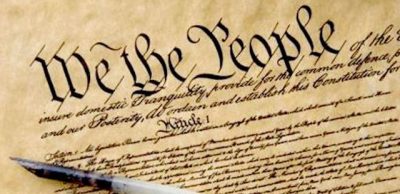America This Week, April 19, 2024: “To Build a Surveillance State.”
What does the “Right to Knowledge” mean, and why is it so dangerous? Walter and Matt ponder the less funny side of the Katherine Maher story. Plus, “To Build a Fire,” by Jack London
Apr 20, 2024

Matt Taibbi: All right, welcome to America This Week. I’m Matt Taibbi.
Walter Kirn: And I’m Walter Kirn.
Matt Taibbi: Walter, you’re looking very Billy Jack this week.
Walter Kirn: And that’s on purpose because there’s some marauders coming to town, some marauding hippies, and I’m going to kick their butts.
Matt Taibbi: You got to do those roundhouse kicks.
Walter Kirn: No, it’s actually because I’m in Las Vegas and I’m at America This Week Las Vegas studio. And it’s freezing cold as it always is in desert communities. You would think it’s going to be warm and it’s not, and you don’t have the right clothes. So I pulled on a jean jacket and I thought it might add a little touch of earthiness and populist’s common sense.
Matt Taibbi: Elan.
Walter Kirn: Yeah, Elan.
Matt Taibbi: Nice. Nice. Well, that’s an appropriate costume for this week’s discussion. We’re going to be talking about somebody who is the opposite in the new NPR CEO. Katherine Maher, who was originally a tangential character… Not tangential, but she was not the main character in the drama involving the NPR senior editor, Uri Berliner. Now former. He resigned in the middle of this week, and we talked about that last week and all the problems that NPR had. And then there’s that famous maple cocaine tweet about how everybody is famous on the internet for five minutes, and your job is to not be that person. Actually it’s, “Each day on Twitter there is one main character. The goal is to never be it.” And she became the main character of Twitter probably last weekend and then this progressed into this thing over the middle of this week, in part because Berliner was suspended and then he was ousted.
And before we get to the whole thing about her, I’m just curious about your reaction to how NPR handled the criticism that they got. Because just having covered all those police brutality stories, it reminded me so much of the way police departments behave when somebody accuses somebody on the force of a brutality complaint or something like that. There was a blue wall at NPR and they just attacked him. They defended the integrity of the institution and said it was his fault and didn’t appear to take any criticism, that seemed to me.
Walter Kirn: Right. Right. Well, you could say they closed ranks, but their ranks were already a solid ice wall, so they didn’t close them more than they already were. Instead of addressing his criticism as we went into last week, which was really about the coverage and the content of NPR, they suggested that besides being a traitor and a snitch in some way, he didn’t like the composition of the place or that somehow he was rejecting their diversity requirements and goals, which wasn’t the aim of his essay. But in any case-
Matt Taibbi: Not at all, I didn’t think.
Walter Kirn: No, he was made into an abominable ingrate and someone who was trying to take down a revered American institution. They got very patriotic about NPR in a way that they’re not patriotic about a lot of things and kicked him out, showing that the ingroup is absolutely inviolable and will not be questioned, will not be challenged. I think they’re on a course for some kind of… All the people who might boycott them don’t listen to them anyway, so that won’t happen. The question is whether there’s some 5% of listeners who still are forming their opinions about life and the world and who might be a little distressed by their closed-mindedness, but in any case, they’ve gotten rid of the dissidents.
Matt Taibbi: The wrong thinker.
Walter Kirn: The wrong thinker. They’ve demonstrated for all of America what happens to you if you’re in one of these institutions and you raise your hand with an objection and now they’ll carry on. They’ll carry on under the leadership of this woman who has been now raked over the coals, to some extent, for many days. Not only was she the object of Twitter fame for one day, she’s really been so solidly for almost a week.
Matt Taibbi: But that’s only because of a rather unique quality to her situation, which is that normally when somebody gets stuck in the middle of a Twitter maelstrom, it’s because of one thing that they said. And if you don’t give the fire oxygen, which is interesting because we’re going to come back to that when we talk about our story today, but normally if you don’t feed the controversy, it doesn’t go on for more than a day. The problem with her is that there’s this gigantic reservoir of stuff in her tweeting history that became central to the entire controversy, and there’s a gigantic quantity of it. So people haven’t even finished going through it, and it’s germane to a real controversy because among other things, when Berliner finally resigned, he referenced these divisive views that I mentioned in my article.
They continue to be on display, and we might as well just give people a little flavor of what that is. There’s a level of this story which is just kind of funny because the comparison I made was to the spoof site, Titania McGrath. And Walter, do you read that site, by the way?
Walter Kirn: No.
Matt Taibbi: The account?
Walter Kirn: When I first started seeing the comparisons, I thought Titania McGrath was a movie character. Then I saw that she is an invented satirical Twitter persona, and she does resemble Maher. How do you pronounce her last name?
Matt Taibbi: Maher. Like Bill Maher.
Walter Kirn: So perfectly that it feels almost like surveillance was done on Maher in order to create the character.


